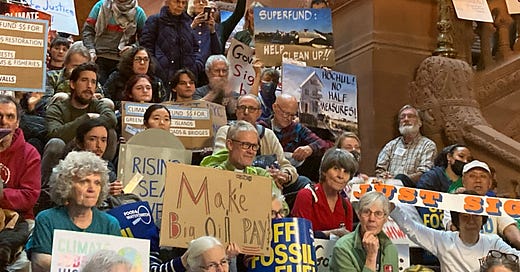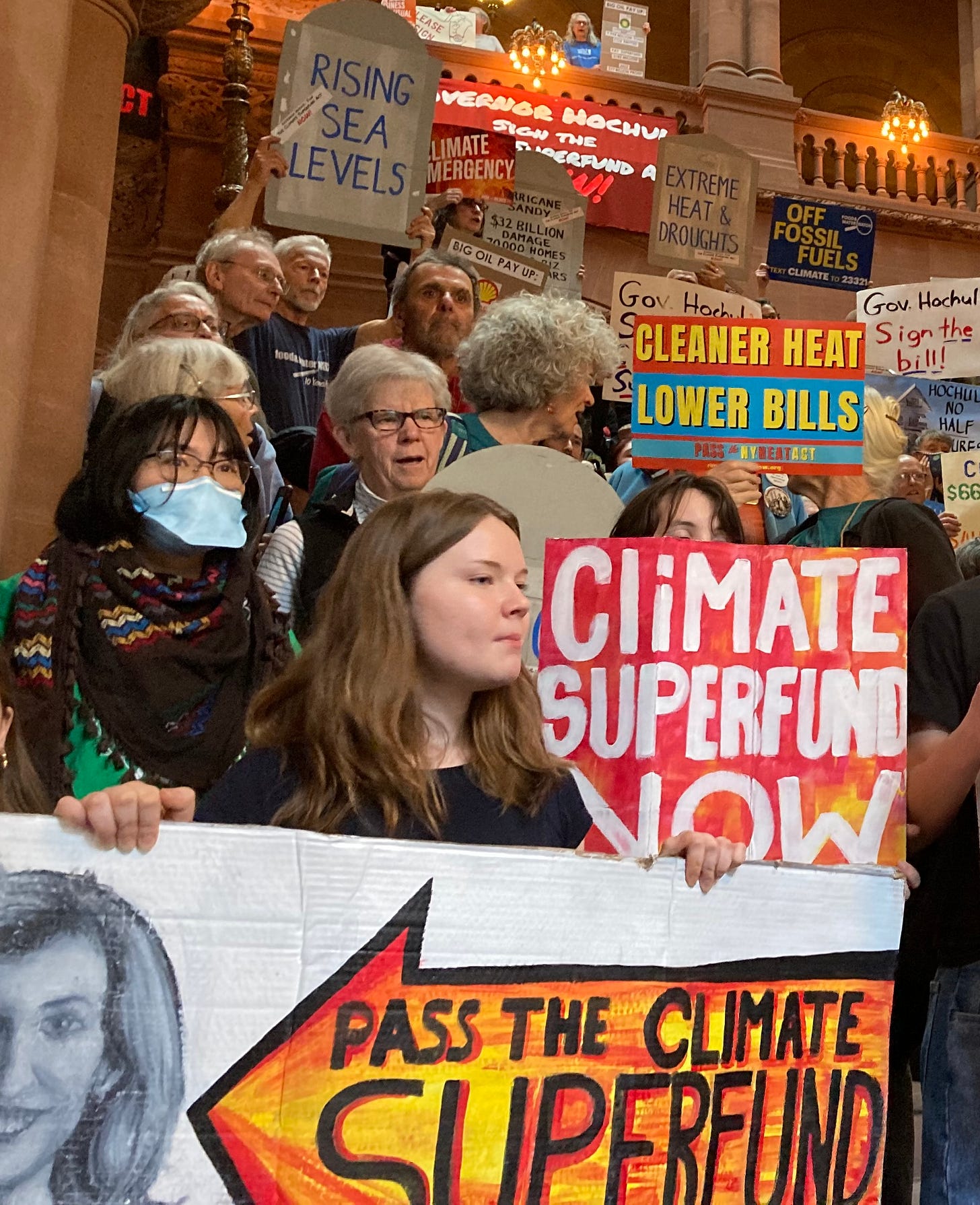New York Enacts Climate Superfund Law to Make Big Oil Pay
The Empire State joins Vermont in passing landmark climate accountability legislation.
Climate activists demonstrated inside the New York capitol building on Dec. 10, 2024, urging Gov. Hochul to sign the climate superfund bill. Credit: Dana Drugmand
The state of New York has enacted ‘landmark’ legislation requiring the largest fossil fuel extractors and refiners to help pay for escalating climate change costs, becoming the second state in the US so far to adopt such a policy. Vermont passed a similar law earlier this year in what experts said was a historic advance in climate accountability.
New York Governor Kathy Hochul signed the Climate Change Superfund Act into law on Thursday, December 26, finalizing the bill that the New York legislature had passed in late spring. The groundbreaking legislation holds major oil and gas companies such as ExxonMobil and Chevron liable for the climate pollution associated with their products, and compels these companies to pay into a newly established state fund that will be used to help finance climate adaptation and resiliency projects. Through the policy, New York aims to recover $3 billion each year over 25 years - $75 billion in total.
“With nearly every record rainfall, heatwave, and coastal storm, New Yorkers are increasingly burdened with billions of dollars in health, safety, and environmental consequences due to polluters that have historically harmed our environment,” Governor Hochul said in a statement. “Establishing the Climate Superfund is the latest example of my administration taking action to hold polluters responsible for the damage done to our environment and requiring major investments in infrastructure and other projects critical to protecting our communities and economy.”
New York is facing hundreds of billions of dollars in climate change-related costs over the next several decades. The climate superfund legislation, according to its backers, is an attempt to shift some of that cost burden from taxpayers and onto the polluting corporations that are most responsible for climate damages and are raking in billions of dollars in profits.
“We refuse to let the entire burden of climate change fall on the backs of our taxpayers while Big Oil reaps record profits at the expense of our future,” said New York Assemblymember Jeffrey Dinowitz, one of the bill’s lead sponsors. “By ensuring the fossil fuel industry pays for some of the damages it has caused, we're addressing the staggering costs of climate adaptation and setting a precedent for the nation to follow.”
There is mounting evidence that Big Oil has known for more than half a century about the potentially catastrophic consequences of unrestrained fossil fuel use, yet has publicly denied and downplayed the dangers while working to obstruct policies to address the problem. Cities, counties, and states across the country have filed lawsuits over the past seven years seeking to hold major oil and gas companies liable for alleged deception on climate change. Those suits are still in early procedural stages.
Climate law experts say the climate superfund legislation is a complementary strategy to pursue accountability from the fossil fuel industry, though it is expected to face its own legal challenges from the industry through the courts. The legislation is modeled after federal and state superfund laws that allow polluters to be held liable for the costs of cleaning up hazardous waste sites, and those laws have withstood legal challenges from polluters.
Credit: Dana Drugmand
New York’s climate superfund law specifically imposes liability on fossil fuel extractors and refiners that account for over one billion tons of greenhouse gas emissions from 2000 to 2018. Determining who those “responsible parties” are, and the amount each must pay, is left up to state environmental regulators who are tasked with developing rules for implementing the law within one year.
“New York has fired a shot that will be heard round the world: the companies most responsible for the climate crisis will be held accountable,” New York state senator Liz Kreuger, another lead sponsor of the bill, said in a statement. She described the new law as a “critical piece of affordability legislation that will deliver billions of dollars every year to ease the burden on regular New Yorkers.”
Independent analyses, including from Nobel-prize winning economist Joseph Stiglitz, find that the policy should not raise costs on consumers. “Concerns about the impact of the Climate Change Superfund on consumer prices are unfounded,” Stiglitz concluded in a letter sent to Governor Hochul encouraging her to sign the legislation. Some business groups opposing the bill also wrote to the governor urging her to veto it.
Climate and environmental activists have been ramping up pressure on Hochul in recent weeks demanding she sign the bill into law before the end of the year. Dozens of activists gathered at the New York capitol building in Albany earlier this month and engaged in a three-day sit-in, and a small handful of them were arrested.
Blair Horner, executive director of New York Public Interest Research Group (NYPIRG), an advocacy group supporting the bill, applauded the governor’s action to sign it. “The governor’s approval of the Climate Change Superfund Act is a welcome holiday gift for New York taxpayers,” Horner said. “This legislation is also designed to ensure that the oil industry will protect consumers from Climate Superfund costs being passed along. It’s a win for taxpayers and consumers.”
New Yorkers who have experienced the devastating impacts of climate change-intensified extreme weather firsthand also praised the enactment of the state’s climate superfund law.
“This summer, a storm flooded my neighborhood and ripped my house right off of its foundation. The house has since been condemned. My family has been living in a hotel, and our insurance company denied our claim. It shouldn’t be all on homeowners to prepare and rebuild from these disasters. If oil and gas companies are contributing to this extreme weather, then they should be responsible for their part or their percentage in paying back who's hurt by it. That’s why I am grateful that Gov. Hochul has signed the Climate Change Superfund Act,” Ronnie Borgese, from Long Island, New York and a member of the group Extreme Weather Survivors, said in a statement.
Vermont Leads the Way
Vermont was the first state in the country to enact a climate superfund bill. The Vermont Climate Superfund Act became law at the end of May this year when the state’s Republican governor Phil Scott allowed it to be put on the books without his signature. The bill passed the Vermont legislature earlier this year with tri-partisan support, and its enactment marked the first-ever legislative measure in the US to hold fossil fuel companies strictly liable for climate change damages.
“With the prospects of national action to address the climate crisis extraordinarily dim right now, it’s more important than ever that states step up to fill the void,” Vermont Public Interest Research Group (VPIRG) executive director Paul Burns said in a statement. “It’s encouraging to see New York joining Vermont in protecting its taxpayers from the full costs of climate change by requiring Big Oil to pay a fair share of the damages their products have caused.”
Similar bills have been introduced in several other states, including Massachusetts, Maryland, California, and New Jersey, and climate activists are hopeful that more states will follow suit.
“If New York passes this, then we’re really off to the races,” Jamie Henn, founder and executive director of Fossil Free Media, which is supporting the national Make Polluters Pay campaign, told me several months ago. “Then it’s not just Vermont. We’ve got a huge state on board and a really powerful state AG’s office to defend the law. And I think that will open the floodgates for more states to pass this type of bill.”





